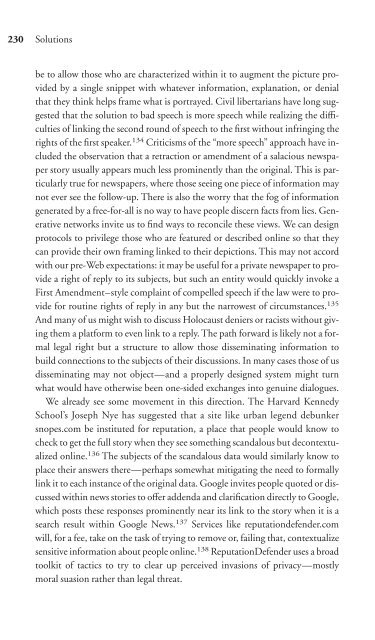Download - Future of the Internet â And how to stop it.
Download - Future of the Internet â And how to stop it.
Download - Future of the Internet â And how to stop it.
You also want an ePaper? Increase the reach of your titles
YUMPU automatically turns print PDFs into web optimized ePapers that Google loves.
230<br />
Solutions<br />
be <strong>to</strong> allow those who are characterized w<strong>it</strong>hin <strong>it</strong> <strong>to</strong> augment <strong>the</strong> picture provided<br />
by a single snippet w<strong>it</strong>h whatever information, explanation, or denial<br />
that <strong>the</strong>y think helps frame what is portrayed. Civil libertarians have long suggested<br />
that <strong>the</strong> solution <strong>to</strong> bad speech is more speech while realizing <strong>the</strong> difficulties<br />
<strong>of</strong> linking <strong>the</strong> second round <strong>of</strong> speech <strong>to</strong> <strong>the</strong> first w<strong>it</strong>hout infringing <strong>the</strong><br />
rights <strong>of</strong> <strong>the</strong> first speaker. 134 Cr<strong>it</strong>icisms <strong>of</strong> <strong>the</strong> “more speech” approach have included<br />
<strong>the</strong> observation that a retraction or amendment <strong>of</strong> a salacious newspaper<br />
s<strong>to</strong>ry usually appears much less prominently than <strong>the</strong> original. This is particularly<br />
true for newspapers, where those seeing one piece <strong>of</strong> information may<br />
not ever see <strong>the</strong> follow-up. There is also <strong>the</strong> worry that <strong>the</strong> fog <strong>of</strong> information<br />
generated by a free-for-all is no way <strong>to</strong> have people discern facts from lies. Generative<br />
networks inv<strong>it</strong>e us <strong>to</strong> find ways <strong>to</strong> reconcile <strong>the</strong>se views. We can design<br />
pro<strong>to</strong>cols <strong>to</strong> privilege those who are featured or described online so that <strong>the</strong>y<br />
can provide <strong>the</strong>ir own framing linked <strong>to</strong> <strong>the</strong>ir depictions. This may not accord<br />
w<strong>it</strong>h our pre-Web expectations: <strong>it</strong> may be useful for a private newspaper <strong>to</strong> provide<br />
a right <strong>of</strong> reply <strong>to</strong> <strong>it</strong>s subjects, but such an ent<strong>it</strong>y would quickly invoke a<br />
First Amendment–style complaint <strong>of</strong> compelled speech if <strong>the</strong> law were <strong>to</strong> provide<br />
for routine rights <strong>of</strong> reply in any but <strong>the</strong> narrowest <strong>of</strong> circumstances. 135<br />
<strong>And</strong> many <strong>of</strong> us might wish <strong>to</strong> discuss Holocaust deniers or racists w<strong>it</strong>hout giving<br />
<strong>the</strong>m a platform <strong>to</strong> even link <strong>to</strong> a reply. The path forward is likely not a formal<br />
legal right but a structure <strong>to</strong> allow those disseminating information <strong>to</strong><br />
build connections <strong>to</strong> <strong>the</strong> subjects <strong>of</strong> <strong>the</strong>ir discussions. In many cases those <strong>of</strong> us<br />
disseminating may not object—and a properly designed system might turn<br />
what would have o<strong>the</strong>rwise been one-sided exchanges in<strong>to</strong> genuine dialogues.<br />
We already see some movement in this direction. The Harvard Kennedy<br />
School’s Joseph Nye has suggested that a s<strong>it</strong>e like urban legend debunker<br />
snopes.com be inst<strong>it</strong>uted for reputation, a place that people would know <strong>to</strong><br />
check <strong>to</strong> get <strong>the</strong> full s<strong>to</strong>ry when <strong>the</strong>y see something scandalous but decontextualized<br />
online. 136 The subjects <strong>of</strong> <strong>the</strong> scandalous data would similarly know <strong>to</strong><br />
place <strong>the</strong>ir answers <strong>the</strong>re—perhaps somewhat m<strong>it</strong>igating <strong>the</strong> need <strong>to</strong> formally<br />
link <strong>it</strong> <strong>to</strong> each instance <strong>of</strong> <strong>the</strong> original data. Google inv<strong>it</strong>es people quoted or discussed<br />
w<strong>it</strong>hin news s<strong>to</strong>ries <strong>to</strong> <strong>of</strong>fer addenda and clarification directly <strong>to</strong> Google,<br />
which posts <strong>the</strong>se responses prominently near <strong>it</strong>s link <strong>to</strong> <strong>the</strong> s<strong>to</strong>ry when <strong>it</strong> is a<br />
search result w<strong>it</strong>hin Google News. 137 Services like reputationdefender.com<br />
will, for a fee, take on <strong>the</strong> task <strong>of</strong> trying <strong>to</strong> remove or, failing that, contextualize<br />
sens<strong>it</strong>ive information about people online. 138 ReputationDefender uses a broad<br />
<strong>to</strong>olk<strong>it</strong> <strong>of</strong> tactics <strong>to</strong> try <strong>to</strong> clear up perceived invasions <strong>of</strong> privacy—mostly<br />
moral suasion ra<strong>the</strong>r than legal threat.


